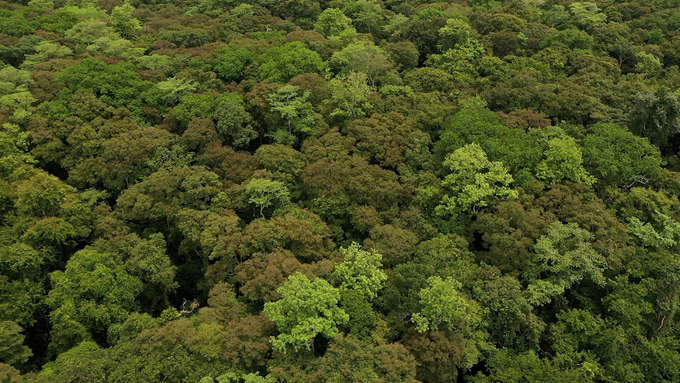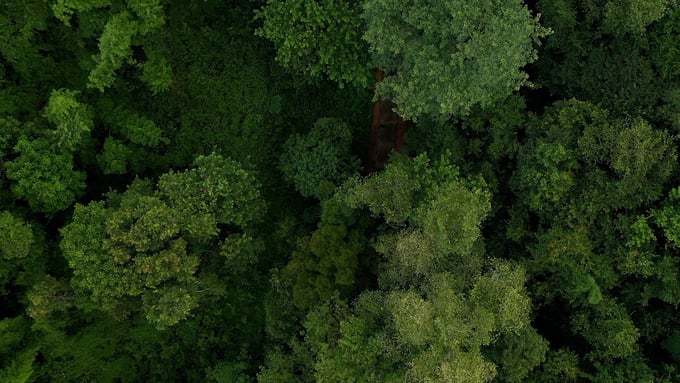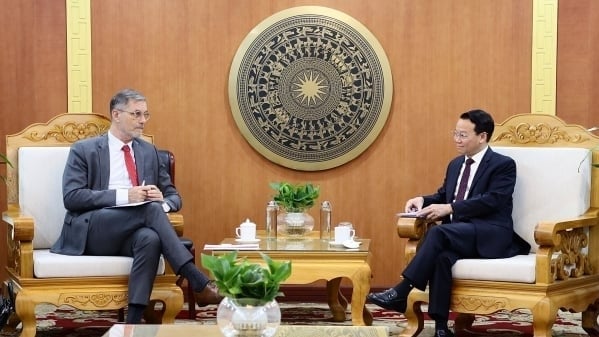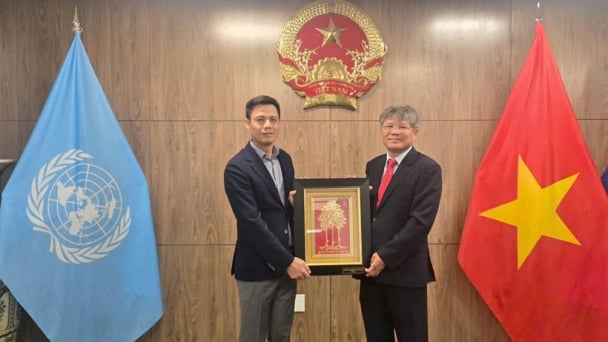May 22, 2025 | 06:16 GMT +7
May 22, 2025 | 06:16 GMT +7
Hotline: 0913.378.918
May 22, 2025 | 06:16 GMT +7
Hotline: 0913.378.918
According to the Law on Environmental Protection, a carbon credit is a tradable certificate that represents the right to emit one ton of carbon dioxide (CO2) or an equivalent amount of other greenhouse gasses.
Countries worldwide are required to reduce greenhouse gass emissions under agreements like the UN Framework Convention on Climate Change (UNFCCC). This requirement has created a demand for emission trading, where countries with surplus emission allowances can sell them to those exceeding their targets. Consequently, a new form of commodity has emerged globally, which is emissions reduction credits or greenhouse gas absorption credits. As CO2 is the standard unit for greenhouse gasses, these transactions are commonly known as carbon credit trading, forming the market of the carbon or carbon credit.

Countries with surplus emission allowances can sell them to those exceeding their targets and vice versa. Photo: Ngoc Diep.
In Vietnam, developing this market is seen as essential for meeting emission reduction commitments and addressing climate change. The carbon market could provide new financial flows, creating incentives and resources for sectors to transition toward green growth and participate effectively in international markets.
The carbon credit market is a trading system that allows organizations to trade, buy, sell, and transfer emissions reductions and CO2 credits.
The carbon credit market originated from the 1997 Kyoto Protocol. There are two main types:
Domestic carbon markets (mandatory): Individuals, organizations, and businesses buy, sell, exchange, and offset emissions quotas and carbon credits as mandated by national or regional regulations.
International carbon markets (voluntary): Individuals, organizations, and countries voluntarily trade carbon credits. This market is based on the standards and mechanisms agreed upon by buyers. With the need for countries to comply with the Paris Agreement, the voluntary carbon market is expected to grow significantly, encouraging economic activities that prioritize sustainability, like forestation over deforestation.
In the scenario of severe environmental pollution, the carbon credit market is an effective solution for companies and society, helping to: promote sustainable development, generate income from emissions reduction activities, contribute to greenhouse gas reduction, enable international cooperation in combating climate change.
Additionally, carbon credits encourage businesses to reduce emissions, provide profit opportunities through selling credits, and help companies project an eco-friendly, professional image aligned with current green trends, attracting attention and gaining high appreciation from society with the current green trend.
In forestry, forest carbon credits result from measures to reduce green house emissions in the sector. Currently, Vietnam is piloting the trade of forest carbon credits in the voluntary market.
Vietnam, with over 14.86 million hectares of forest (42.02% coverage), including more than 10.1 million hectares of natural forest and over 4.7 million hectares of planted forest. Forests absorb and store a large amount of carbon, making the forestry sector a net negative emitter (absorbing far more than it emits), thus presenting significant potential for trading emissions reduction results and forest carbon credits.

Currently, Vietnam is piloting the trade of forest carbon credits in the voluntary market. Photo: Ngoc Diep.
Generating carbon credits requires compliance with specific market standards and independent third-party verification.
The Forestry Department is researching forest carbon credit potential to define a clear path for market participation.
On January 7, 2022, the government issued Decree No. 06/2022/NĐ-CP, which outlines emission reduction regulations and ozone layer protection. The decree includes a pilot phase until 2027 for the exchange and offsetting of carbon credits in potential sectors.
From 2028, a carbon credit trading platform will be operational, facilitating the connection of domestic carbon credits with regional and global markets.
The Ministry of Finance is currently finalizing a draft proposal for developing Vietnam's carbon market, seeking input from stakeholders.
The proposal aims to develop carbon credit market in Vietnam, reduce greenhouse gass emissions cost-effectively for businesses and society, promote low-emission technologies, enhance Vietnamese businesses' competitiveness, and foster a low-carbon economy, proactively response to climate change.
The Vietnamese carbon credit market includes two types of commodities: Emission quotas for greenhouse gases; carbon credits verified by the Ministry of Natural Resources and Environment
Participants in the market include facilities within designated sectors that must conduct greenhouse gas inventories; organizations implementing carbon credit-generating programs and projects; organizations and individuals eligible to invest in and trade carbon credits under legal regulations; and transaction-support organizations.
In a recent meeting on finalizing the Draft Proposal for establishing and developing the carbon market in Vietnam, Deputy Prime Minister Trần Hồng Hà emphasized that the carbon market holds great potential for attracting investment and advancing technology.
However, countries have yet to reach a consensus on mechanisms, policies, technical standards, and the fair, clear, and transparent allocation of carbon quotas on a global scale. Therefore, the proposal outlines a roadmap for piloting the carbon market in Vietnam with a “learning by doing” approach to anticipate and align with global trends.
Participants in the market include facilities within designated sectors that must conduct greenhouse gas inventories; organizations implementing carbon credit-generating programs and projects; organizations and individuals eligible to invest in and trade carbon credits under legal regulations; and transaction-support organizations.
In a recent meeting on finalizing the Draft Proposal for establishing and developing the carbon market in Vietnam, Deputy Prime Minister Trần Hồng Hà emphasized that the carbon market holds great potential for attracting investment and advancing technology.
However, countries have yet to reach a consensus on mechanisms, policies, technical standards, and the fair, clear, and transparent allocation of carbon quotas on a global scale. Therefore, the proposal outlines a roadmap for piloting the carbon market in Vietnam with a “learning by doing” approach to anticipate and align with global trends.
Participants in the market include facilities within designated sectors that must conduct greenhouse gas inventories; organizations implementing carbon credit-generating programs and projects; organizations and individuals eligible to invest in and trade carbon credits under legal regulations; and transaction-support organizations.
In a recent meeting on finalizing the draft proposal for establishing and developing the carbon market in Vietnam, Deputy Prime Minister Tran Hong Ha emphasized that the carbon market holds great potential for attracting investment and advancing technology.
However, countries have yet to reach a consensus on mechanisms, policies, technical standards, and the fair, clear, and transparent allocation of carbon quotas on a global scale. Therefore, the proposal outlines a roadmap for piloting the carbon market in Vietnam with a “learning by doing” approach to anticipate and align with global trends.
Translated by Kieu Chi

(VAN) On May 21, Minister of Agriculture and Environment Do Duc Duy worked with Mr. Olivier Brochet, Ambassador Extraordinary and Plenipotentiary of the French Republic to Vietnam.

(VAN) VRG recently conducted a visit and working trip to the United States to demonstrate its efforts in redefining the role of rubber enterprises in the global value chain.

(VAN) In 2024, over 295 million people across 53 countries and territories faced acute hunger—an increase of almost 14 million people compared to 2023, while the number of people facing catastrophic levels of hunger reached a record high.

(VAN) World Environment Day 2025 (June 5) carries the theme 'Beat Plastic Pollution' continuing to emphasize the global urgency of addressing the plastic waste crisis.

(VAN) This was the assessment shared by experts at the workshop titled 'Assessing the Role and Potential of Low-Emission Rice Production Systems in Vietnam,' held on the morning of May 19.

(VAN) Cai Rong Port is the fisheries control center of Quang Ninh, helping to monitor fishing vessels, combat IUU fishing, and remove the EC's 'yellow card'.

(VAN) The German Agricultural Society (DLG) explores the possibility of establishing a mechanization service center in Vietnam’s Mekong Delta to support farmers in accessing and utilizing advanced machinery.